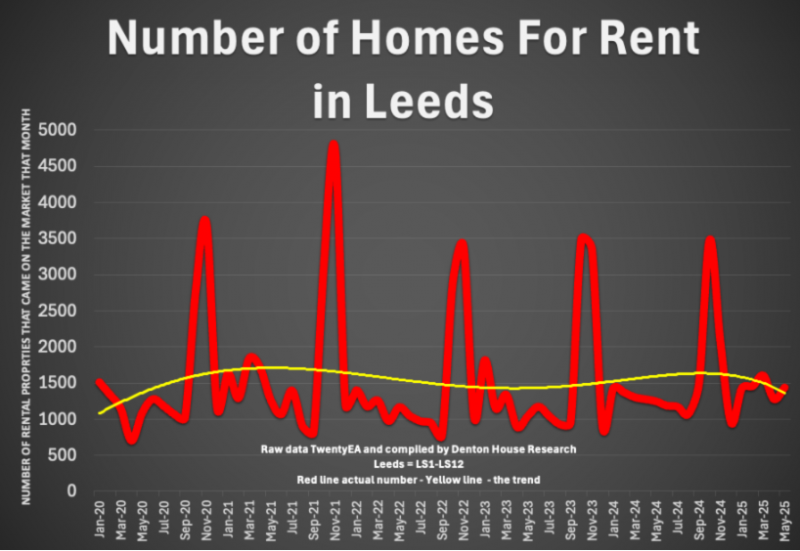SEARCH FOR PROPERTIES NOW...
Student
Professional
Leeds Rental Property Market: 5 Year Overview & 2025 Landlord Outlook
Over the past five years, Leeds's private rental market has experienced a significant growth in rents. The average monthly rent has increased from £1,000 in 2020 to £1,241 in 2025, representing a 24% rise.
These local trends are interesting when compared with the national picture, where the average monthly rent increased from £1,331 in 2020 to £1,803 in 2025, a rise of 35%. Regionally, in Yorkshire and the Humber, the rent rose from £757 to £1,003, a 32% increase.
Yet, as affordability tightens, some landlords who were too optimistic with their pricing have been forced to reduce their asking rents; 24% of rental listings across the UK experienced price adjustments in 2025 alone. Despite this, tenants in Leeds are now paying substantially more than they were just five years ago.
While rents have increased, the supply of rental properties in Leeds over the last five years has declined.
- Leeds averaged new rental listings each month in 2020 – 1,501
- Leeds averaged new rental listings each month in 2021 – 1,761
- Leeds averaged new rental listings each month in 2022 – 1,422
- Leeds averaged new rental listings each month in 2023 – 1,509
- Leeds averaged new rental listings each month in 2024 – 1,508
- Leeds averaged new rental listings each month in 2025 – 1,444

Seasonal trends are also notable. Rental supply tends to peak in late spring and early autumn, with October being particularly strong (because of the student market), while winter months, especially December, show the lowest levels. This cyclical pattern was disrupted during the pandemic but has since resumed, albeit with generally lower volumes.
The current imbalance of limited supply and high demand has tightened the market. Nationally, rental availability remains more than 25% below pre-pandemic levels.
In Leeds, agents continue to report strong tenant demand, though the frenzy seen in 2022 and 2023 has calmed somewhat. Listings still attract multiple enquiries, particularly due to the city’s affordability relative to nearby towns and cities. Low vacancy rates persist, and while the supply/demand gap may be narrowing slightly, it remains significant.
Analysts estimate that 50,000 more rental homes are needed nationwide each year to restore pre-2020 availability. Until that gap closes, upward pressure on rents in cities like Leeds is likely to continue. While the scale of rental increases is expected to moderate compared to previous years, I am forecasting a further 3% to 4% rental growth in 2025.
Challenges and Opportunities for Leeds Landlords
The outlook for landlords in Leeds is a mix of pressure and potential. While rents are higher and tenant demand remains strong, landlords face rising costs, evolving regulations, and taxation changes.
Challenges for Leeds Landlords
Regulation and Reform
The planned Renters’ Reform Bill in England is one of the most significant changes on the horizon. It proposes the abolition of Section 21 'no fault' evictions and introduces stronger tenant protections. This is a source of concern for many landlords, particularly when managing tenancies that are problematic. Proposed changes to minimum EPC ratings have added to the pressure, with nearly one in two landlords in many surveys expressing concern about the cost of improving older properties.
Rising Finance and Maintenance Costs
Interest rate hikes have driven buy-to-let mortgage rates from between 2% and 3% just after the pandemic to 5% or more by 2024. However, the Bank of England's recent lowering of its base rate to its current level of 4.25% has not squeezed landlord profit margins as much. However, inflation has also increased the cost of repairs and materials. This is important as many landlords now spend around a fifth of their rental income on maintenance.
Taxation Pressure
Recent changes to mortgage interest relief and Capital Gains Tax have reduced profitability for many Leeds landlords. Since 2017, higher-rate taxpayers have been required to pay tax on rental income before deducting interest, thereby reducing their net yield. Added to this are potential further CGT reforms and the administrative burden of Making Tax Digital. These pressures have already contributed to an exodus of some landlords. Data from TwentyEA indicated that in Q1 2025, 15.6% of homes listed for sale were previously rented, up from 9.8% the previous year.
Tenant Expectations and Affordability
With living costs high, tenants expect more from their homes, including better insulation, faster broadband, and modern amenities. Rent arrears remain a concern, with research from Denton House showing that between 5% and 6% of UK tenants with self-managing landlords are in arrears, and just under 2% with managed properties. Leeds landlords must now carefully balance rental increases with the long-term sustainability of their tenants. The shift to rolling tenancies under the reform proposals prioritises tenant retention.
Opportunities for Leeds Landlords
Strong Tenant Demand
Despite economic pressures, Leeds continues to see strong rental demand. Its affordability and good connectivity make it attractive for couples and families alike. Leeds properties in good condition let quickly, with minimal voids.
Improved Yields
Rising rents have lifted yields to their highest point in a decade. For those Leeds landlords without mortgages or with low debt, increased rental income directly boosts profitability. Even landlords with mortgages can maintain healthy margins if rental prices remain strong.
Reduced Competition
As some Leeds landlords exit the sector, those who stay benefit from less competition. The expansion of existing landlords' portfolios, along with a fresh wave of new, motivated landlords, means that new investment opportunities exist. If you are a Leeds landlord, we can consult our existing landlord database to see if any portfolios could be purchased at a fair price with existing tenants in the properties.
In conclusion, Leeds's rental market presents both challenges and opportunities. Landlords willing to navigate the changing landscape, invest in quality, and adapt to evolving tenant expectations can still find it a profitable and resilient investment.
Whether you are a self-managing landlord or a landlord who uses another agent in Leeds, if you would like to pick my brain on the best strategies to employ, please give me a call.
Back to news









